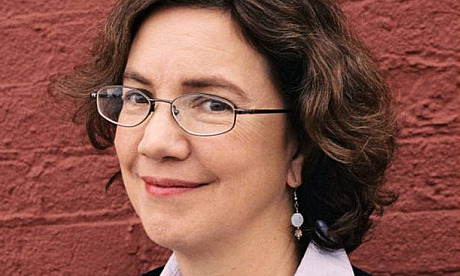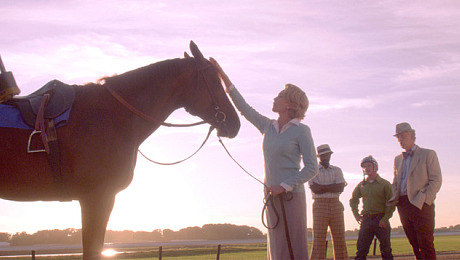Day: October 7, 2010
Upgrade
With the recent departures of Eugene Hernandez and Todd McCarthy creating a certain heebie-jeebie atmosphere at Indiewire, columnist Anne Thompson has been named indiewire’s Editor at Large. A good call, hearty congrats. Seasoned perspective, honcho status, leadership qualities.

Anne Thompson
As I Know it
I don’t have a problem with Kathryn Heigl, as some do (or did), but there’s definitely something clenched about her. And clenched people make me feel clenched. I do know that films of this sort have over-used those instant-dislike scenarios (i.e., a guy being blase and aloof on a first date and the woman despising him for this). There must be other ways, other cliches. Note: I wasn’t even invited to see this thing.
Expired
If I’m not mistaken, there’s a moment in The Exorcist when the possessed and uglified Regan MacNeil (Linda Blair) shouts out “zounds!” And it hit me that no one in this country uses that oath any more. I did a search in alphadictionary.com and they don’t even have it listed. I don’t know how far it stretches back, but I’m guessing close to a century. I’ve been searching around a definitive online dictionary of extinct terminology — nouns, verbs, slang.
Indian Beer
Consider a trailer for Wedding Night, a 2011 short film by HE comment-maven Sabina England (a.k.a. “DeafBrownTrashPunk”).
"Master-Race Propaganda"
Randall Wallace‘s Secretariat (Disney, 10.8) is currently running with a 63% Rotten Tomatoes rating. I used to get grades like this on high school exams. It basically means “fail” although you got more than half the questions right. Secretariat gets some things right also, but it’s an overall flunk. I didn’t hate it — the racing footage is wonderful — but I loathe the white-ass Republican atmosphere. As I wrote last Sunday, “You never forget you’re watching a Randall Wallace family-values movie for the schmoes.”

You can be emotionally affected by Secretariat (fine, knock yourself out), but you can’t call it a “great movie,” which is what Roger Ebert has done. It’s a disproportionate use of the term and unfair to films that truly deserve it. I do, however, agree with this Ebert passage: “There’s a scene here when Penny Chenery and her horse look each other in the eye for a long time on an important morning. You can’t tell me they weren’t both thinking the same thing.”
I agree with Awards Daily‘s Sasha Stone that O’Hehir’s Salon review, titled “A Gorgeous Creepy American Myth”, is the best of the lot.
“In its totality Secretariat is a work of creepy, half-hilarious master-race propaganda almost worthy of Leni Riefenstahl,” he says early on, “and all the more effective because it presents as a family-friendly yarn about a nice lady and her horse.
“Secretariat [presents] a honey-dipped fantasy vision of the American past as the Tea Party would like to imagine it, loaded with uplift and glory and scrubbed clean of multiculturalism and social discord.
“In the world of this movie, strong-willed and independent-minded women like Diane Lane‘s Penny Chenery are ladies first (she’s like a classed-up version of Sarah Palin feminism), left-wing activism is an endearing cute phase your kids go through (until they learn the hard truth about inheritance taxes), and all right-thinking Americans are united in their adoration of a Nietzschean Uberhorse, a hero so superhuman he isn’t human at all.
“Religion and politics are barely mentioned in the story of Chenery and her amazing horse, but it’s clear that Secretariat was constructed and marketed with at least one eye on the conservative Christian audiences who embraced The Blind Side. The film opens with a voice-over passage from the Book of Job and ends with a hymn. Wallace, also the director of We Were Warriors and the writer of Pearl Harbor and Braveheart, is one of mainstream Hollywood’s few prominent Christians, and has spoken openly about his faith and his desire to make movies that appeal to ‘people with middle-American values.’
“It’s legitimate to wonder exactly what Christian-friendly and ‘middle-American’ inspirational values are being conveyed here, or whether they’re just providing cover for some fairly ordinary right-wing ideology and xenophobia. This long-suffering female Job overcomes such tremendous obstacles as having been born white and Southern and possessed of impressive wealth and property, and who then lucks into owning a genetic freak who turned out to be faster and stronger than any racehorse ever foaled.”
Room Service
What’s cool about this besides the obvious assets? The techno music. The score is by Gabriel Yared, who won an Oscar for The English Patient and was nominated for two other Minghellas (Cold Mountain, The Talented Mr. Ripley). Update: Right — Yared had nothing to do with the techno. It’s a Muse track.
Somebody said somewhere that Depp looks a little like Billy Crystal in this role — Crystal with hair and a beard. I briefly spoke with Crystal at a Sundance party six or seven years ago. Boy, was he gloomy! Take comedians off the stage and they’re the Lords of Downerville.
Italian policeman 2: You wish to report a murder.
Johnny Depp: Attempted murder.
Italian policeman 2: That’s not so serious.
Johnny Depp: Not when you downgrade it from murder. But when you when you upgrade it from room service, it’s quite serious.
Weekend
I’m driving to Philadelphia today for a visit with Dylan, now in his third year at the University of the Arts. And then back to Manhattan and beyond on Friday. I’ll be attending the Hamptons Int’l Film Festival Friday through Sunday. Never been before. Staying in Wainscott. Across the river and into the trees.
Leaps and Bounds
I’d be lying if I said I was hot to see Rob Marshall‘s Pirates of the Caribbean: On Stranger Tides (Disney, 5.20.11). Yes, the prospect of digital 3D IMAX mildly entices, and Ian McShane as a drunken Blackbeard…whatever. But I heard something last night about Marshall’s direction of the action scenes, which is that he’s choreographed them to some extent like musical dance numbers, or (another way of putting it) in the jaunty acrobatic vein of Burt Lancaster in The Crimson Pirate. So that’s agreeable, if true. Taken with a grain.

Two In The Chest
My favorite Michael Douglas performance, bar none, and one of the best stoner movies ever — a subtle pot high laced with intelligent middle-aged thought. Each and every Wonder Boys shot, it seems, is covered in fog and murk and Pittsburgh dampness. Odd, but I’d totally forgotten about Katie Holmes being in this.
Leave Us Alone
I don’t like the use of “happy families” as a ploy to get you to feel something in a movie. I was happy when I was married with two little kids, but that’s my memory, my history — and I don’t like some movie butting in and saying, “Here’s a story that links to all that, but which deals in threat and trauma. That gets you, right?”
But anything with Russell Crowe has to be seen and settled into. And Paul Haggis‘s In The Valley of Elah got it exactly right.
Incidentally: I really hate embed codes that go on and on and on.
